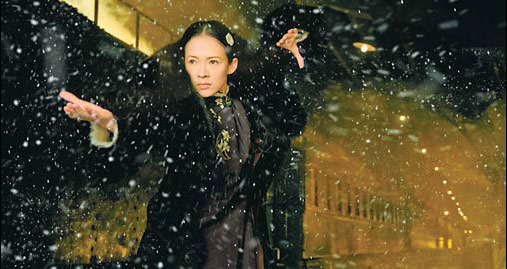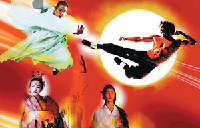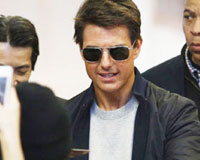Jumbled plot serves up visual extravaganza
Updated: 2013-01-11 10:58
By Raymond Zhou (China Daily)
|
|||||||||||
 |
|
Zhang Ziyi plays a lead role in Wong Kar-wai's new movie, The Grandmaster. Provided to China Daily |
|
 |
The Grandmaster is two hours of sumptuously photographed scenes in search of narrative coherence. Take any five-minute sequence from the movie, and it is an indisputable masterpiece. But strangely, the parts are larger than the whole. The plot structure has such big holes in it that the complete martial arts academy can march through. Wong might have shot so much material he could assemble another fragmented movie out of it.
The title character is Ip Man, who popularized Wing Chun-style boxing in Hong Kong. His tenuous claim to fame partly rests with one picture he took with his youthful student Bruce Lee. That detail is lovingly recreated in Wong's movie, bringing a smile to every audience member familiar with the folklore of Hong Kong cinema or martial arts. That child actor has a jaw eerily similar to that of the kung-fu superstar.
Related: Even martial-arts films face competition in the West
 |
The Grandmaster is almost a biopic of Ip Man, chronicling his wild days in his hometown Foshan. The town is now a suburb of Guangzhou, where Ip Man spends much of his time in an over-crowded and over-decorated brothel, up to his last days in Hong Kong.
Like the half-dozen Ip Man movies before this one, Wong's version touches on his suffering during the Japanese occupation, but there is no resistance fist-style or otherwise. Ip Man as portrayed by Tony Leung is polite, reserved and resilient. He does not go around picking fights, but he is not afraid to strut his stuff when challenged.
We also learn that the master is reticent around his home. He rarely shows any emotion to his wife. When Zhang Ziyi's character, a martial-arts opponent who once challenged him and won, reveals her affection for him during their last meeting, he does not respond in any way either.
The biggest surprise is not his lack of verbal expression, but his lack of involvement in the main dramatic arc. Ip Man has two elaborate fight sequences, one with traitorous Ma San and the other with Gong Er, Zhang's character. There are a few smaller ones, but they are all exhibition games, so to speak, friendly contests that are the action equivalent of Woody Allen-style chatter.
The real grandmaster, in terms of dramatic conflict, turns out to be Gong Er, daughter of the old-generation master. She takes the initiative to safeguard her father's honor by standing up to Ip Man, and then, to revenge her father by throwing down the gauntlet for Ma San. That fight sequence, staged next to a moving train, is the most testosterone-firing scene in a movie that is largely brooding and pensive.
|
 |
As portrayed by Zhang Ziyi, the character shows a steely resolve reminiscent of her role in Crouching Tiger, Hidden Dragon. Her encounter on the train with Chang Chen hints at a subplot of romantic entanglement, and her last scene at the opium bed is full of pathos.
With a dancer's training, Zhang is capable of graceful fluidity in her martial-arts movements that is not only a source of aesthetic pleasure, but also an extension of her body language and hence her dramatic expressiveness.
Like 2046, her previous collaboration with Wong Kar-wai and Tony Leung, Zhang Ziyi, with one pouty look, manages to take the spotlight amid narrative indecisiveness and atmospheric grandstanding. It is a remarkable mixture of continuing the spirit of her best-known roles, especially those in Crouching Tiger, Hidden Dragon and 2046, and discovering a newfound maturity.
One cannot talk about a martial-arts movie without dwelling a little on its fight choreography. Obviously, Wong Kar-wai is very serious about the authenticity of every move of every fighting style. Many of the scenes are turned into textbook dissection, with jargon flying. Also, the action shots tend to be disjointed and choppy, leaving one dizzy but not excited. The repeated staging in backlit rainfall is great to look at, but has been done to death before. (Think The Matrix Revolutions.)
But I'm nitpicking. If you disregard the storyline, the movie has lavish photography and abundant music not every educational program can afford. And you may fall in love with Chinese kung fu, at least Wing Chun and other styles of boxing, by watching this action-spiced meditation on alliances broken and dreams dashed.
The Grandmaster opened in China on Jan 8. It will be the opening film for the upcoming Berlin International Film Festival, where director Wong will serve as president of the jury.
Contact the writer at raymondzhou@chinadaily.com.cn
Related Stories
24th Annual Palm Springs International Film Festival in California 2013-01-06 16:07
HBO's Liberace film aims to humanize through love story 2013-01-06 14:06
Al Pacino inhabits Phil Spector in Mamet's HBO film 2013-01-06 11:21
'Amour' takes US film critics' top prize as best film 2013-01-06 09:44
Romanian film director Nicolaescu dies at age 82 2013-01-03 20:14
Today's Top News
Police continue manhunt for 2nd bombing suspect
H7N9 flu transmission studied
8% growth predicted for Q2
Nuke reactor gets foreign contract
First couple on Time's list of most influential
'Green' awareness levels drop in Beijing
Palace Museum spruces up
Trading channels 'need to broaden'
Hot Topics
Lunar probe , China growth forecasts, Emission rules get tougher, China seen through 'colored lens', International board,
Editor's Picks

|

|

|

|

|

|





